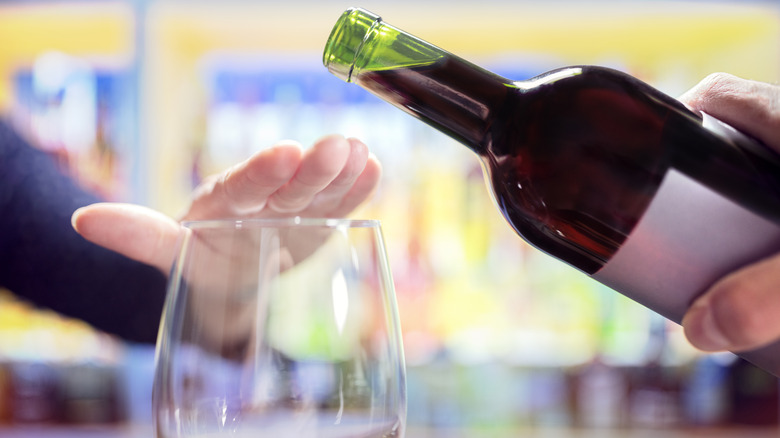When You Stop Drinking Wine, This Is What Happens To Your Body
There is no doubt that there are benefits to enjoying a glass of wine. Moderate red wine consumption, such as one five-ounce glass a day for women and two for men, can have an upside. Red wine can raise HDL or "good" cholesterol and improve blood vessel health through antioxidants (Here's everything you've ever wondered about antioxidants, explained). It also contains healthy vitamins and minerals, such as iron, potassium, and calcium. However, it can also cause allergic reactions and worsen such conditions as gout and liver disease.
However, in spite of the antioxidant content, regular wine consumption can lead to weight gain, elevated blood pressure, and disrupted sleep patterns. Additionally, the ethanol and the acetaldehyde found in alcoholic drinks may be linked to certain cancers. Too much wine can also damage your heart muscles, leading to a condition known as cardiomyopathy, and can trigger irregular heart rhythms, raise blood pressure, and increase the risk of heart attacks. Because of this, it may be wise to consider opting for a different beverage at dinner. If you do, these are some of the benefits you'll see.
Your sleep quality improves
Alcohol can have a disruptive effect on sleep, impacting rapid eye movement (REM) sleep and worsening the effects of sleep apnea. Additionally, it may also disrupt the production of melatonin in the brain. This is a hormone that is released to send a signal to the body that it's time to sleep. When melatonin production is impacted by the effects of alcohol, it can result in broken and unrestful sleep.
According to a study conducted by the Sleep Foundation, 60% of people report sleeping better once they give up drinking. Additionally, 40% of the people surveyed reported noticing an effect on their sleep after having three to four drinks in the evening. People who give up drinking, even for just a few weeks, have reported that they sleep more soundly, feel more refreshed upon waking up, and feel much less tired throughout the day.
You feel more hydrated
According to the Addiction Center, drinking alcohol pulls fluids from your body, which can leave you dehydrated — especially if it's consumed in large amounts. People who drink heavily also tend to neglect proper hydration and often make poor nutritional choices, which only worsens alcohol's effects. Putting the wine back on the shelf can lead to rehydration and improved and healthier skin, with less puffiness and blotching.
As explained by sober life coach and podcaster Courtney Anderson, alcohol's diuretic effect increases the production of urine, which leaves you dehydrated. As a result, you can experience such symptoms as dizziness, fatigue, and headaches. It can also create an imbalance of electrolytes, which can actually be exacerbated when you stop drinking. Because of this, you should make sure to focus on replenishing your electrolytes by drinking electrolyte-rich drinks and eating foods that are similarly high in electrolytes. These include bananas, nuts, and leafy greens.
Your weight could drop
Wine can be very high in calories, according to Alis Behavioral Health, with a five-ounce glass containing anywhere from 120 to 130 calories. Some varieties can even top out at 200 calories or more. The high calorie count tends to go in tandem with the amount of sugar present. Sweeter wines and dessert wines can have a higher amount of calories, as can wines that have more alcohol. Given these factors, cutting out wine will automatically reduce the amount of calories you consume. (Here are some myths about calories you should stop believing.)
Additionally, people tend to reach for a drink such as wine as a way of dealing with stress. However, the irony is that alcohol use can increase anxiety and raise stress levels. It has a tendency to spike the levels of cortisol in the body, which can cause heart disease, emotional regulation issues, and weight gain. Taking wine off the table can help to balance out stress, which can lower cortisol levels and aid in keeping the weight off.
You may feel more focused
According to a 2019 study published in the Canadian Medical Association Journal, adults, particularly women, experienced a bump in their mental clarity once they gave up drinking. The study showed that the people who had the sharpest mental health were the people who didn't drink at all. However, among the women who were profiled, the ones who quit drinking actually managed to score 1.4 points higher on a mental health scale than women who had never drunk at all.
Quitting drinking can actually lead to physical changes in your brain, which can also positively affect your mental clarity. Drinking can damage the frontal lobe, which affects memory, reasoning, and motor function, among other things. Giving up drinking can cause the frontal lobe to regenerate over time, allowing you to reclaim some of those functions. It can also improve the production of such brain chemicals as dopamine and serotonin, both of which can help enhance your feelings of happiness and well-being.
You can get a boost for your immune system
According to Business Insider, alcohol can wreak havoc on your body as it works its way through your system. When taken in excess, it can cause such conditions as gastritis and inflammatory bowel disease. It can also suppress your immune system, leaving you potentially susceptible to everything from serious respiratory illnesses to the common cold. The Alcohol and Drug Foundation reports that even drinking five to six drinks can suppress your immune system for the length of an entire day.
A 2015 study published in Alcohol Research: Current Reviews showed that alcohol use impacts both innate immunity, which is your first line of defense against disease, and adaptive immunity, which is how your body responds to threats. These disruptions can leave you more susceptible to inflammation, organ damage, and slower healing. Additionally, it can make respiratory infections worse, with the damage to your airways sometimes not showing up until an illness like the flu crops up, making everything more dangerous.
Your blood sugar can stabilize
During periods without food, such as sleeping and between meals, your liver helps to keep your blood sugar levels stable by releasing glucose into the bloodstream (via Johns Hopkins Medicine). However, when you drink, the liver shifts tracks from producing glucose to processing alcohol. As the alcohol is broken down, certain byproducts are created that interfere with the liver's ability to produce glucose. This disruption can bring down blood sugar levels rapidly, increasing the risk of hypoglycemia.
Wine, which is packed with sugar and carbs, can lead to sharp increases in blood sugar, according to Guardian Recovery. But once you stop drinking, your body begins to regulate those levels more steadily. Without the frequent spikes that drinking causes, particularly from sugary drinks or wine, your glucose levels can become more predictable. As an added bonus, cutting out the carbs can help prevent weight gain. And, since excess weight is also linked to insulin resistance, bringing your risk of obesity down.
Your blood pressure and heart rate can improve
A 2020 study published in the Cochrane Database of Systematic Reviews showed that alcohol has a clear impact on both blood pressure and heart rate. The study revealed that, within the first six to 12 hours of drinking in moderate to high amounts, blood pressure tended to go down. However, after about 13 hours, particularly following high alcohol intake, blood pressure rose above baseline levels. Additionally, heart rate increases while drinking and can remain elevated for longer periods of time with higher amounts.
According to a 2006 study published in the Journal of Hypertension, 13 out of the 14 participants saw their blood pressure return to normal levels after stopping drinking. The researchers also found that withdrawal from alcohol actually caused levels of stress hormones like aldosterone and cortisol to go down. At the outset of the study, heavy drinkers had higher levels of substances called endothelin and PAI-1, both of which are linked to blood vessel constriction. As they abstained from drinking, these levels dropped steadily.
Your cancer risk could drop
Drinking alcohol raises your risk of cancer because of the various ways that it harms your body (via the Centers for Disease Control and Prevention). It can damage your DNA, cause long-term inflammation, and raise the levels of hormones like estrogen, which is linked to breast cancer. In the mouth and throat, it makes it easier for harmful chemicals to enter your cells. Over time, these harmful chemicals can increase the chances of cancer developing throughout the body.
According to Medical News Today, alcohol is classified by the World Health Organization as a Group 1 carcinogen with links to several types of cancer. These include mouth, liver, throat, breast, and colorectal cancers. This isn't to say that abstinence from alcohol eliminates the risk entirely, but it does reduce the damage to the body that can cause cancers to form, especially oral and esophageal cancers. And the longer someone stays alcohol-free, the more the risk declines.
Your gut health could rebound
Alcohol can upset the balance of your gut and oral microbiomes (via MD Anderson Cancer Center). Drinking wine and other alcoholic beverages can cause inflammation, a looser gut barrier, and harmful substances entering the liver and bloodstream. As the body breaks the alcohol down, it creates toxic byproducts—known as metabolites—that can negatively affect the gut. Over time, it can lead to a weakening of the protective lining of the intestines, causing a condition known as "leaky gut," in which harmful substances leak into the bloodstream and trigger inflammation. (Here are some foods to eat and to avoid if you have a leaky gut.)
Giving up drinking has the benefit of potentially undoing much of the damage done to your digestive system. While it is important to see a doctor to determine what can be reversed and how much damage has been done, many people have seen improvement over time. In most cases, it can take around three weeks of sobriety for gut inflammation to begin healing, but if ulcers have developed, that healing could take months.









